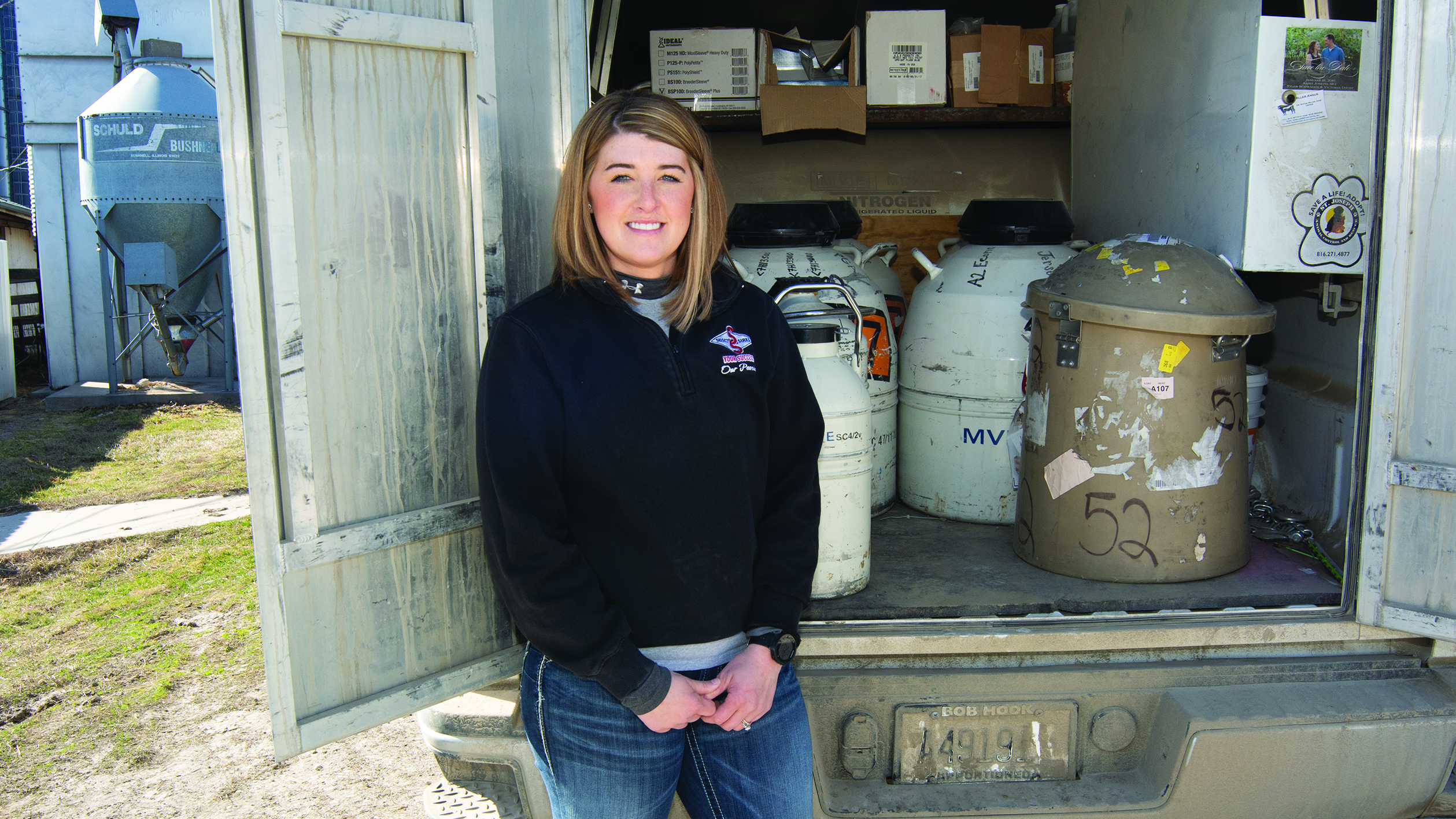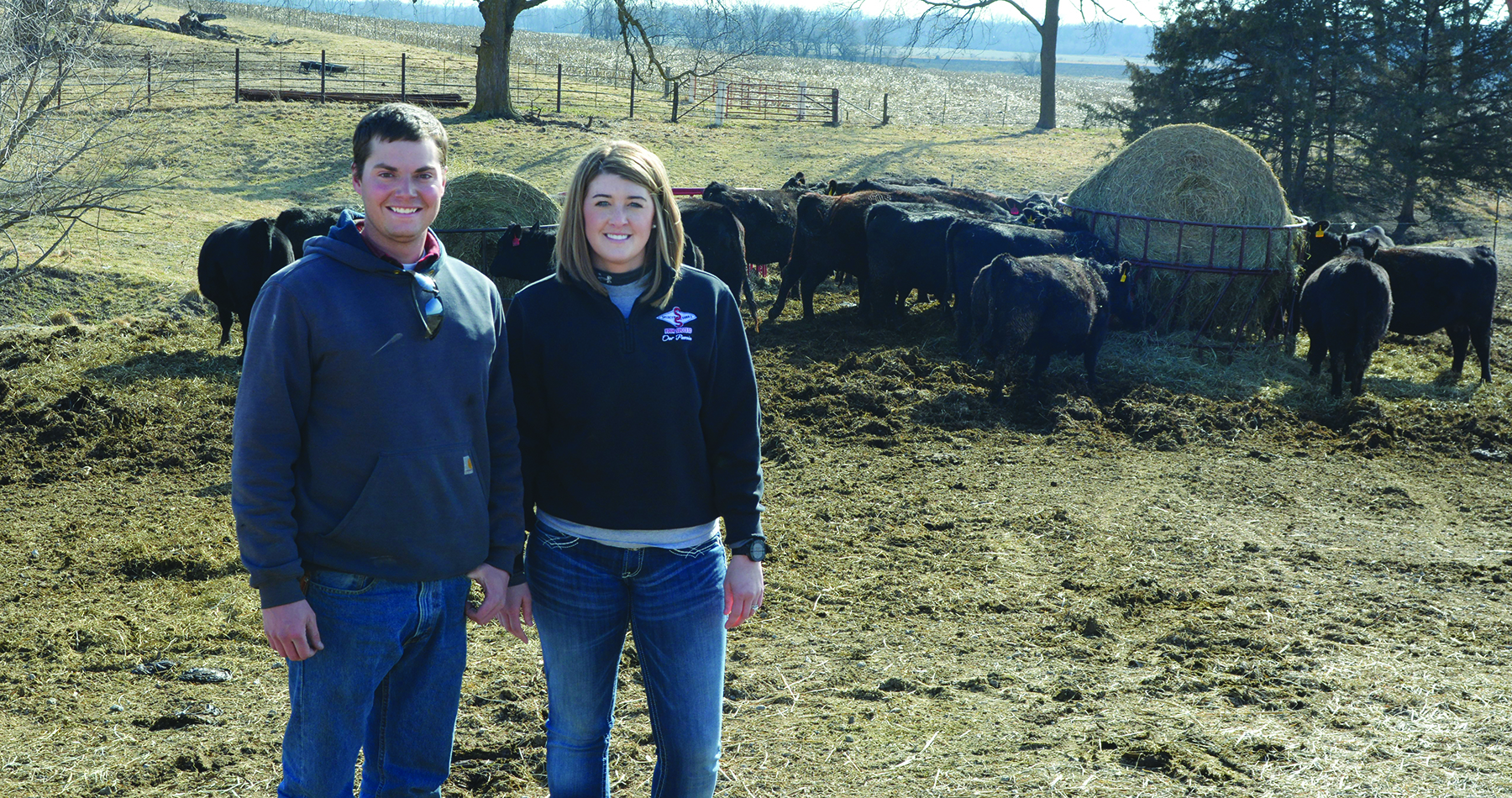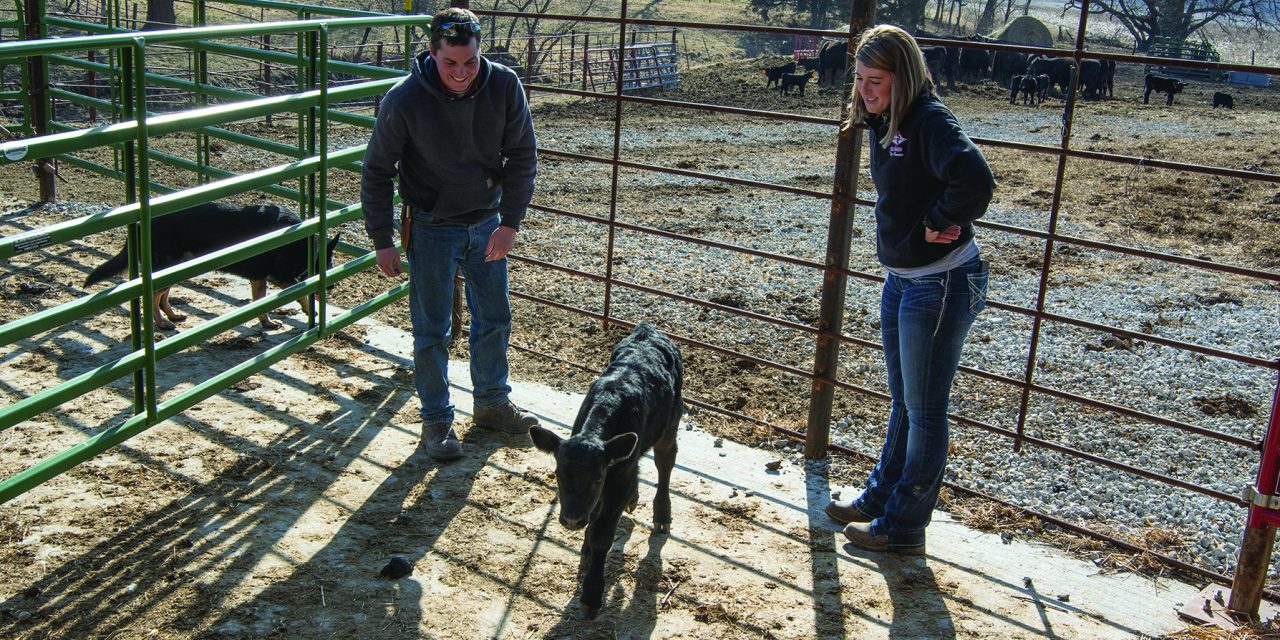When Victoria Schwader talks about her job, folks get uncomfortable. She sells bull semen and artificially inseminates (AI) cows for a living. Her mother considers discussing her work at the dinner table inappropriate, she says with a laugh, yet her job is an important part of modern agriculture, and a great ice-breaker into broader discussions about what farmers and ranchers do.

As a farm wife and chair of the Missouri Farm Bureau Young Farmers & Ranchers Committee, Victoria is spending more time conversing with consumers and her peers about agriculture. When she is not working for her employer, Select Sires, she can be found working on the farm with her husband, Tyler, near Easton. Victoria did not come from a farm, but grew up in a rural area. Tyler, however, is a full-time farmer. He is the sixth generation in his dad’s family and the seventh in his mom’s family to farm.
“I was born in Iowa in a rural community next to a lot of cattle and fell in love with them when I was very little,” Victoria says. That experience stayed with her as she earned a degree in animal science at the University of Missouri. She began her career with Select Sires after school and now travels to cattle and dairy farms from northwest Missouri to eastern Nebraska.
She says balancing her job with helping Tyler farm on weekends is hard work, but worthwhile. “People don’t understand farming like they used to. I get a lot of questions about why I farm and particularly with my job I get a lot of ‘You do what?’ responses,” she says. “We want this to be here for our children. We are trying to figure out the most efficient way to feed the world and people don’t understand sometimes what you have to do to make that possible.”
Her job puts her on the road often, but she makes her own hours and enjoys every chance to see different farms and how farmers raise their cattle. “Tyler likes it because I get to bring home tips that I have learned.”
Besides growing traditional row crops and hay, the couple helps with the family commercial Angus beef herd where Victoria’s work experience is welcome. “We are working on growing our purebred herd and seeing where we can go with that,” she says.
She has always had a passion for animals, but her passion for farming is driven by her husband’s love of the business. “I get to work with animals every day and work with those people I think respect them the most. Farmers know their animals’ personalities and know their animals have to be happy to produce.”
Victoria has had several opportunities to express her passion to those far removed from farming and ranching. During Thank a Farmer Week in February, their Buchanan County Farm Bureau hosted a Meet a Farmer event at a St. Joseph Natural Grocers store. The store sells 100 percent organic products, and Victoria and Tyler thought it was the perfect location because shoppers there want to know more about their food.
“It doesn’t necessarily align with what I think farming is or should be, but that doesn’t mean choices aren’t good for the consumer. They had questions about how do we raise beef, antibiotics and hormones in our food. Some had never met a farmer. It was both an eye-opening and rewarding experience.”
She believes explaining today’s agriculture is an uphill battle, but necessary. One limiter in these days of social media interaction is the lack of Internet access in rural areas. That issue was a major conversation among young farmers at the YF&R Leadership Conference last February. Victoria pointed out another challenge – rising land costs.

Victoria and Tyler farm on his family farm, Schwader Farms, but expanding or buying out a family operation is daunting financially for young farmers. “If you are a young farmer with this dream to build a bigger farm, but how do you do that? What are you supposed to do if someone has to buy out other family members? Where is the financing going to come from for these young farmers?”
Learning from other young farmers who have faced these and other challenges is a major benefit of involvement in Farm Bureau’s YF&R program. Victoria says as the average age of a farmer rises, it becomes more difficult to meet other beginning farmers. The average age of a farmer last year was 58. “It is nice to meet people your age going through the same struggles you are,” she says.
Since Victoria officially took on her one-year term at the YF&R Conference, she has worked with a committee of 16 young farmers from eight districts in the state. The group, many of them young and married like the Schwaders, oversee the conference and YF&R program with the guidance of Eric Volmer, director of field services. Victoria also receives advice from the state board of directors, which she serves as an advisory member.
She says opening doors to any young adult tied to the agriculture industry, not just active farmers, is good for the program and the organization. The committee is now working with members of the Pike County Farm Bureau to mimic their success in fundraising for benefits and scholarships. “We are trying to figure out how to spread their efforts in other counties. They’ve been able to build a great network of young farmers.”
Work is ongoing to promote involvement in YF&R contests. One possibility is developing more awareness of Farm Bureau at a younger age through high school vocational agriculture programs. Although the YF&R program is designed for those in their late 20s and 30s, Victoria believes getting people involved in Farm Bureau at a younger age could help them stay involved. The YF&R program has long been a source of strong Farm Bureau leaders.
“Farm Bureau was always Tyler’s thing and he’s on the Farm Bureau board in Buchanan County,” she says. “I particularly had no interest in policy or lawmaking. Then, I started talking to other members. Seeing how tangible the policy and lawmaking was because of Farm Bureau is unbelievable. Bringing ideas to your board, bringing something in your community or state that needs change, to the resolutions process and seeing it come to fruition so quickly makes lawmaking so tangible. You can affect change in your whole state by just commenting to a board member.”
Affecting change is what the Schwaders are doing with the help of many young farmers. Any farmer or rancher age 35 or younger can be involved. Contact your local county Farm Bureau to find who is on the county board. Talk to them to learn more about the organization.
This article originally appeared in Show Me Missouri Farm Bureau Magazine, a membership publication that covers all of the issues for members and includes interesting features, opinions and the latest information on benefits and services. Become a Missouri Farm Bureau member to subscribe!


